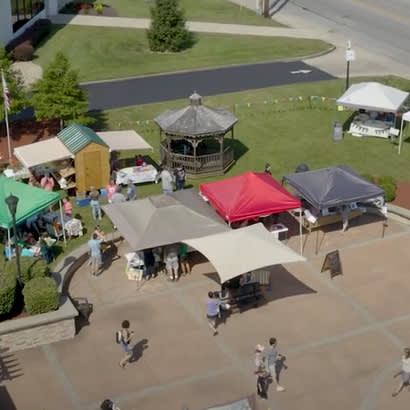According to Feeding America, 1 in 6 children and older adults in the United States experience the daily struggle of food insecurity. These families are further challenged by unfair policies and systems that result in socio-economic disparities and limit access to the social determinants of health (SDOH) — including access to transportation, quality education, and safe and healthy environments — which can decrease life expectancy up to 30 years. Food insecurity is reported as the biggest unmet social need by 35 percent of communities and is highest among people of color, households below the poverty threshold, and households with children.
Partnerships between farmers markets and parks and recreation agencies are a unique way to meet community members where they are by creating food access strategies and connecting people to benefit programs. Federally funded programs, such as USDA child nutrition programs and SNAP/WIC benefit programs, help close the hunger gap for food insecure households. However, while these programs have been instrumental in advancing food security, decades of systemic barriers and stigma prevent millions of eligible households from obtaining these nutrition supports. Research shows that affordability, time, poor experiences and distrust of doctors and social services prevent many low-income families from accessing primary care, hindering their ability to obtain food insecurity screenings, referrals and benefit enrollment assistance.
Accepting SNAP/WIC benefits and leveraging incentive programs at farmers markets can support food access in communities. Park and recreation professionals can assist WIC/SNAP initiatives through food assistance programming.
For example, park and recreation professionals at West Allis-West Milwaukee Recreation and Community Services in Wisconsin, support their local farmers market WIC voucher program by allowing online orders for farmers market food that can be paid for by WIC benefits. The team then packages and delivers the food to those who ordered it.
In Connecticut, park and recreation professionals at the New London Recreation Department, provide farmers market vouchers to their WIC and SNAP customers. This program, supported by NRPA’s Parks as Community Nutrition Hubs grant program, allows WIC and SNAP customers to get more bang for their buck while increasing their access to nutritious, locally grown food.
When addressing equitable food access, consider other opportunities your market can offer, such as:
● A mobile market program that meets community members where they are and eliminates transportation barriers.
● Online ordering methods, where orders are placed online and delivered to community members.
● A voucher program, perhaps to program participants or in partnership with the local SNAP/WIC/Aging or Seniors’ office, to increase the amount of funds available to be spent at a market.
● Meal programs through the USDA Child Nutrition Programs during market hours, perhaps paired with a family meal program to encourage community members of all ages to share a healthy meal.
Resources to support SNAP, WIC and seniors’ benefit acceptance at markets:
● Explore the benefits of and steps toward accepting SNAP and WIC benefits at your market.
● The Farmers Market Coalition has developed a step-by-step guide to assessing your market’s needs, implementing SNAP, attracting customers, and implementing an incentive program.
● The Farmers Market Coalition developed a series of questions a market can work through to decide if offering EBT (electronic benefit transfer) services is right for them. Supporting resources include:
○ Overview document on EBT point of sale devices
○ Tech Bytes mini-webinar on EBT point of sale devices
● The Nutrition Incentive Hub, created by the GusNIP, provides training, technical assistance, reporting, and evaluation support to current and potential GusNIP grantees to increase the purchase of fruits and vegetables.
● For those new to designing SNAP and incentive programs at farmers markets, these Practitioner Papers offer a concise history of how they have been designed and used.
● The USDA Farmers Market Nutrition Program (FMNP) issues coupons to eligible WIC participants to buy food from farmers, farmers markets or roadside stands that have been approved by the state agency to accept FMNP coupons.
● The USDA Seniors Farmers' Market Nutrition Program is designed to provide low-income seniors with access to locally grown fruits, vegetables, honey and herbs.
● The Michigan Farmers Market Association has an overview of SNAP, as well as resources to support market acceptance.


